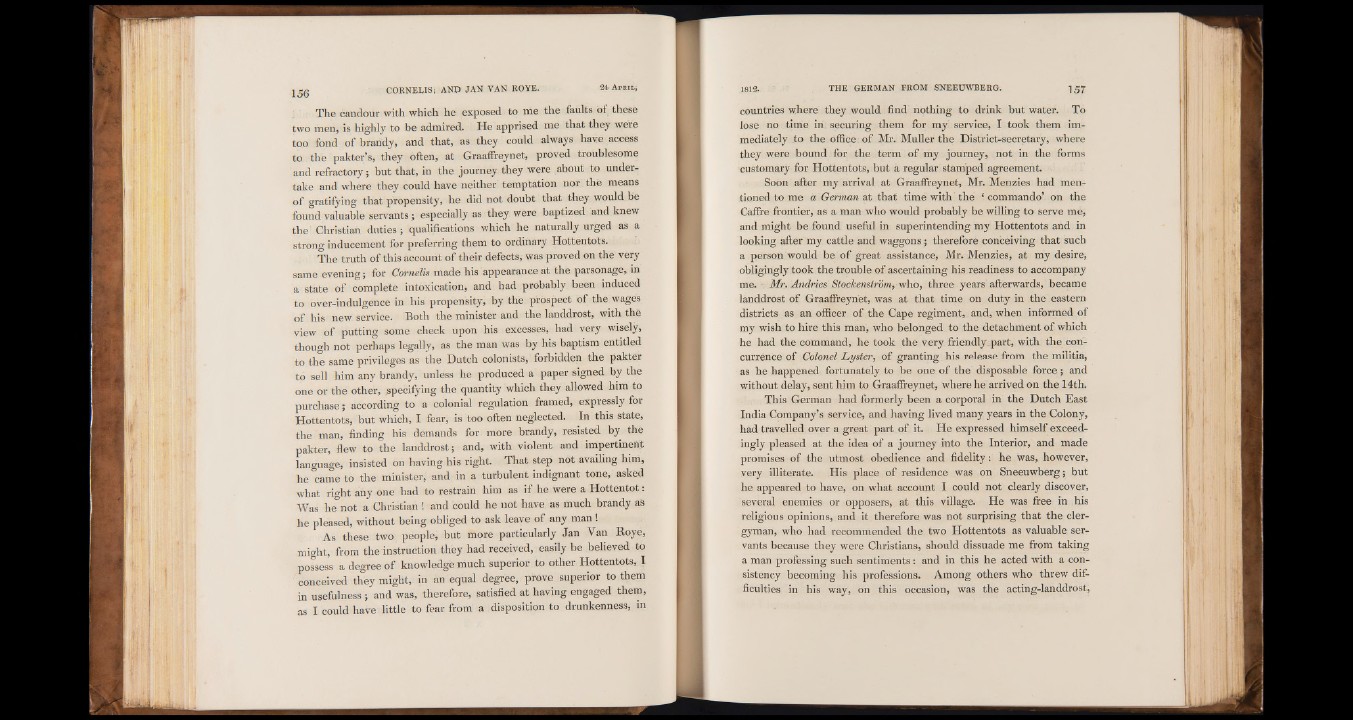
The candour with which he exposed to me the faults of these
two men, is highly to be admired. He apprised me that they were
too fond of brandy, and that, as they could always have access
to the pakter’s, they often, at Graaffreynet, proved troublesome
and refractory; but that, in the journey they were about to undertake
and where they could have neither temptation nor the means
of gratifying that propensity, he did not doubt that they would be
found valuable servants; especially as they were baptized and knew
the Christian duties; qualifications which he naturally urged as a
strong inducement for preferring them to ordinary Hottentots.
The truth of this account of their defects, was proved on the very
same evening; for Cornells made his appearance at the parsonage, in
a state of complete intoxication, and had probably been induced
to over-indulgence in his propensity, by the prospect of the wages
of his new service. Both the minister and the landdrost, with the
view of putting some check upon his excesses, had very wisely,
though not perhaps legally, as the man was by his baptism entitled
to the same privileges as the Dutch colonists, forbidden the pakter
to sell him any brandy, unless he produced a paper signed by the
one or the other, specifying the quantity which they allowed him to
purchase; according to a colonial regulation framed, expressly for
Hottentots, but which, I fear, is too often neglected. In this state,
the man, finding his demands for more brandy, resisted by the
pakter, flew to the landdrost; and, with violent and impertinent
language, insisted on having his right. That step not availing him,
he came to the minister, and in a turbulent indignant tone, asked
what right any one had to restrain him as if he were a Hottentot:
Was he not a Christian ! and could he not have as much brandy as
he pleased, without being obliged to ask leave of any man !
As these two people, but more particularly Jan Van Roye,
might, from the instruction they had received, easily be believed to
possess a degree of knowledge much superior to other Hottentots, I
conceived they might,: in an equal degree, prove superior to them
in usefulness ; and was, therefore, satisfied at having engaged them,
as I could have little to fear from a disposition to drunkenness, in
countries where they would find nothing to drink but water. To
lose no time in securing them for my service, I took them immediately
to the office of Mr. Muller the 1 )istrict-secretary, where
they were bound for the term of my journey, not in the forms
customary for Hottentots, but a regular stamped agreement.
Soon after my arrival at Graaffreynet, Mr. Menzies had mentioned
to me a German at that time with the ‘ commando’ on the
Caffre frontier, as a man who would probably be willing to serve me,
and might be found useful in superintending my Hottentots and in
looking after my cattle and waggons; therefore conceiving that such
a person would be of great assistance, Mr. Menzies, at my desire,
obligingly took the trouble of ascertaining his readiness to accompany
me. . Mr. Andries Stockenstrom, who, three years afterwards, became
landdrost of Graaffreynet, was at that time on duty in the eastern
districts as an officer of the Cape regiment, and, when informed of
my wish to hire this man, who belonged to the detachment of which
he had the command, he took the very friendly.part, with the concurrence
of Colonel Lyster, of granting his release from the militia,
as he happened fortunately to be one of the disposable force ; and
without delay, sent him to Graaffreynet, where he arrived on the 14th.
This German had formerly been a corporal in the Dutch East
India Company’s service, and having lived many years in the Colony,
had travelled over a great part of it. He expressed himself exceedingly
pleased at the idea of a journey into the Interior, and made
promises of the utmost obedience and fidelity: he was, however,
very illiterate. His place of residence was on Sneeuwberg; but
he appeared to have, on what account I could not clearly discover,
several enemies or opposers, at this village. He was free in ,his
religious opinions, and it therefore was not surprising that the clergyman,
who had recommended the two Hottentots as valuable servants
because they were Christians, should dissuade me from taking
a man professing such sentiments: and in this he acted with a consistency
becoming his professions. Among others who threw difficulties
in his way, on this occasion, was the acting-landdrost,